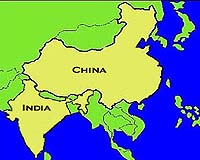| . |  |
. |
Brussels (AFP) Oct 31, 2009 Europe's leaders wanted to send a clear message to Asian giants from this week's summit -- one about coughing up their share in the fight against climate change. In the end, though, the need to cave in to last-minute Czech threats to get its flagship treaty for reform ratified and a typically European split over Tony Blair's worth as its first president probably drowned it out. On climate, they agreed that developing nations will need 100 billion euros (150 billion dollars) annually by 2020 -- hardly a new figure and one with lots of wriggle-room when it comes to who should pay which part. The signal more likely to be retained farther afield would be the European Union's failure to nail down its own share amid sharp differences between its powerhouses France and Germany, and nine newer members led by Poland. "The EU now has a strong negotiating position" to take to Copenhagen for international climate talks starting on December 7, said Swedish Prime Minister Fredrik Reinfeldt as a two-day summit ended on Friday. Calling for developed countries to cut greenhouse gas emissions by 80-95 percent by 2050, the European leaders nonetheless went into very little detail on how this could be done. "We can now look the rest of the world in the eyes and say we Europeans have done our job," said the head of the bloc's executive branch, Jose Manuel Barroso. "Offers are not a blank cheque... we are ready to act if our (global) partners are ready to deliver," he added in a pointed message. British Prime Minister Gordon Brown, who had hoped for a meatier agreement spelling out Europe's contribution, said the deal shows that "the European Union and its member states are ready to contribute their fair share. "Of course it is conditional on other countries playing a part too," he stressed. Even the headline annual figure will only be found through an unspecified combination of developing countries' "own efforts, the international carbon market and international public finance." The deal was swiftly criticised by Greenpeace which said the EU "lacked the nerve... to put its money where its mouth is." Lithuanian President Dalia Grybauskaite said experts would now seek a concrete formula on how the bill is divided up in Europe. The 27-nation bloc prides itself on leading the fight against climate change, and had already agreed to cut greenhouse gas emissions by 20 percent by 2020. In its bid to persuade China, India and the United States to make swingeing cuts themselves, Europe also said it is willing to increase those cuts to 30 percent if the rest of the developed world does likewise at Copenhagen. French President Nicolas Sarkozy said efforts would now go into meetings with global partners in the run-up to Copenhagen, but said plans to attend an Asia-Pacific forum in Singapore had been stymied. "I would have found that useful, since only Europe will be missing, were we to go," he said. However, "not everyone is keen, and I'm thinking notably of the United States." The summit did see EU leaders clear a major obstacle holding up its Lisbon reform treaty, giving the Czechs the opt-out from a new rights charter that their president suddenly demanded after parliamentary ratificiation. That paves the way for a new-look EU with its first-ever president. However, a special summit will have to be held, probably within the next fortnight, to decide on that and another key appointment -- after France and Germany effectively slammed the door shut on former British premier Blair's candidacy. France and Germany will join forces to choose a new-look EU's first big boss, France's Sarkozy said, adding that he and German Chancellor Angela Merkel had agreed to back "the same candidate." Ironically, Sarkozy was the first to suggest Blair as a contender -- before backtracking a couple of weeks ago citing a "problem" over a lack of British engagement with core EU policies. In defiance of Brown, Europe's socialists are instead targeting the foreign policy job, after Luxembourg Foreign Minister Jean Asselborn warned of "a link for the coming generation between George W. Bush and Tony Blair." Share This Article With Planet Earth
Related Links Climate Science News - Modeling, Mitigation Adaptation
 China, India could shame rich nations: top UN climate scientist
China, India could shame rich nations: top UN climate scientistBeijing (AFP) Oct 30, 2009 China and India could use their growing clout to shame developed countries into committing to a climate change deal in Copenhagen in December, the UN's top climate scientist said Friday. Rajendra Pachauri, chairman of the Nobel-winning Intergovernmental Panel on Climate Change, told AFP on the sidelines of a conference in Beijing the two Asian giants would have "a lot of moral force" at the ... read more |
|
| The content herein, unless otherwise known to be public domain, are Copyright 1995-2009 - SpaceDaily. AFP and UPI Wire Stories are copyright Agence France-Presse and United Press International. ESA Portal Reports are copyright European Space Agency. All NASA sourced material is public domain. Additional copyrights may apply in whole or part to other bona fide parties. Advertising does not imply endorsement,agreement or approval of any opinions, statements or information provided by SpaceDaily on any Web page published or hosted by SpaceDaily. Privacy Statement |